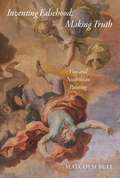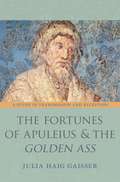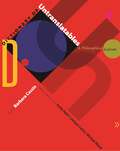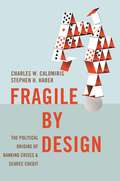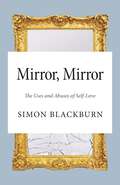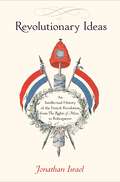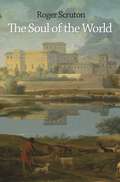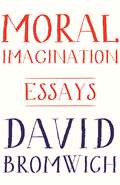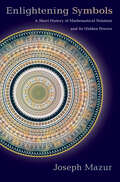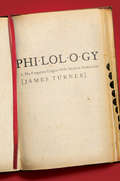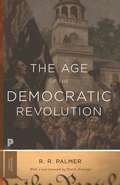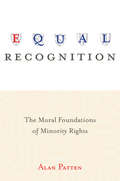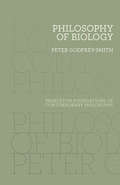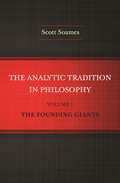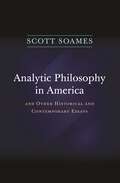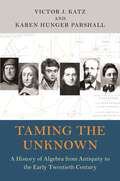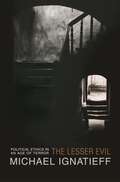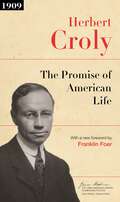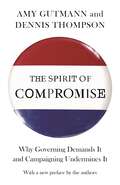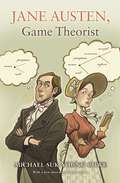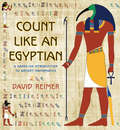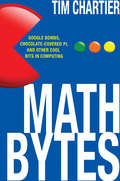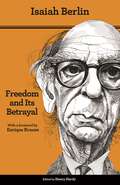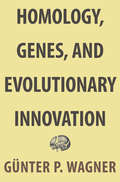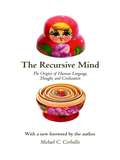- Table View
- List View
Inventing Falsehood, Making Truth: Vico and Neapolitan Painting (Essays in the Arts)
by Malcolm BullHow the philosophy of Giambattista Vico was influenced by eighteenth-century Neopolitan paintingCan painting transform philosophy? In Inventing Falsehood, Making Truth, Malcolm Bull looks at Neapolitan art around 1700 through the eyes of the philosopher Giambattista Vico. Surrounded by extravagant examples of late Baroque painting by artists like Luca Giordano and Francesco Solimena, Vico concluded that human truth was a product of the imagination. Truth was not something that could be observed: instead, it was something made in the way that paintings were made--through the exercise of fantasy.Juxtaposing paintings and texts, Bull presents the masterpieces of late Baroque painting in early eighteenth-century Naples from an entirely new perspective. Revealing the close connections between the arguments of the philosophers and the arguments of the painters, he shows how Vico drew on both in his influential philosophy of history, The New Science. Bull suggests that painting can serve not just as an illustration for philosophical arguments, but also as the model for them--that painting itself has sometimes been a form of epistemological experiment, and that, perhaps surprisingly, the Neapolitan Baroque may have been one of the routes through which modern consciousness was formed.
The Fortunes of Apuleius and the Golden Ass: A Study in Transmission and Reception (Martin Classical Lectures #32)
by Julia Haig GaisserThis book traces the transmission and reception of one of the most influential novels in Western literature. The Golden Ass, the only ancient Roman novel to survive in its entirety, tells of a young man changed into an ass by magic and his bawdy adventures and narrow escapes before the goddess Isis changes him back again. Its centerpiece is the famous story of Cupid and Psyche. Julia Gaisser follows Apuleius' racy tale from antiquity through the sixteenth century, tracing its journey from roll to codex in fourth-century Rome, into the medieval library of Monte Cassino, into the hands of Italian humanists, into print, and, finally, over the Alps and into translation in Spanish, French, German, and English. She demonstrates that the novel's reception was linked with Apuleius' reputation as a philosopher and the persona he projected in his works. She relates Apuleius and the Golden Ass to a diverse cast of important literary and historical figures--including Augustine, Fulgentius, Petrarch, Boccaccio, Bessarion, Boiardo, and Beroaldo. Paying equal attention to the novel's transmission (how it survived) and its reception (how it was interpreted), she places the work in its many different historical contexts, examining its representation in art, literary imitation, allegory, scholarly commentary, and translation. The volume contains several appendixes, including an annotated list of the manuscripts of the Golden Ass. This book is based on the author's Martin Classical Lectures at Oberlin College in 2000.
Dictionary of Untranslatables: A Philosophical Lexicon (Translation/Transnation #35)
by Barbara CassinCharacters in some languages, particularly Hebrew and Arabic, may not display properly due to device limitations. Transliterations of terms appear before the representations in foreign characters.This is an encyclopedic dictionary of close to 400 important philosophical, literary, and political terms and concepts that defy easy—or any—translation from one language and culture to another. Drawn from more than a dozen languages, terms such as Dasein (German), pravda (Russian), saudade (Portuguese), and stato (Italian) are thoroughly examined in all their cross-linguistic and cross-cultural complexities. Spanning the classical, medieval, early modern, modern, and contemporary periods, these are terms that influence thinking across the humanities. The entries, written by more than 150 distinguished scholars, describe the origins and meanings of each term, the history and context of its usage, its translations into other languages, and its use in notable texts. The dictionary also includes essays on the special characteristics of particular languages--English, French, German, Greek, Italian, Portuguese, Russian, and Spanish.Originally published in French, this one-of-a-kind reference work is now available in English for the first time, with new contributions from Judith Butler, Daniel Heller-Roazen, Ben Kafka, Kevin McLaughlin, Kenneth Reinhard, Stella Sandford, Gayatri Chakravorty Spivak, Jane Tylus, Anthony Vidler, Susan Wolfson, Robert J. C. Young, and many more.The result is an invaluable reference for students, scholars, and general readers interested in the multilingual lives of some of our most influential words and ideas.Covers close to 400 important philosophical, literary, and political terms that defy easy translation between languages and culturesIncludes terms from more than a dozen languagesEntries written by more than 150 distinguished thinkersAvailable in English for the first time, with new contributions by Judith Butler, Daniel Heller-Roazen, Ben Kafka, Kevin McLaughlin, Kenneth Reinhard, Stella Sandford, Gayatri Chakravorty Spivak, Jane Tylus, Anthony Vidler, Susan Wolfson, Robert J. C. Young, and many moreContains extensive cross-references and bibliographiesAn invaluable resource for students and scholars across the humanities
Fragile by Design: The Political Origins of Banking Crises and Scarce Credit (The Princeton Economic History of the Western World #50)
by Charles W. Calomiris Stephen HaberWhy stable banking systems are so rareWhy are banking systems unstable in so many countries—but not in others? The United States has had twelve systemic banking crises since 1840, while Canada has had none. The banking systems of Mexico and Brazil have not only been crisis prone but have provided miniscule amounts of credit to business enterprises and households.Analyzing the political and banking history of the United Kingdom, the United States, Canada, Mexico, and Brazil through several centuries, Fragile by Design demonstrates that chronic banking crises and scarce credit are not accidents. Calomiris and Haber combine political history and economics to examine how coalitions of politicians, bankers, and other interest groups form, why they endure, and how they generate policies that determine who gets to be a banker, who has access to credit, and who pays for bank bailouts and rescues.Fragile by Design is a revealing exploration of the ways that politics inevitably intrudes into bank regulation.
Mirror, Mirror: The Uses and Abuses of Self-Love
by Simon BlackburnFrom the author of Think, an enlightening and entertaining exploration of narcissism and self-esteemEveryone deplores narcissism, especially in others. The vain are by turns annoying or absurd, offending us whether they are blissfully oblivious or proudly aware of their behavior. But are narcissism and vanity really as bad as they seem? Can we avoid them even if we try? In Mirror, Mirror, Simon Blackburn, the author of such best-selling philosophy books as Think, Being Good, and Lust, says that narcissism, vanity, pride, and self-esteem are more complex than they first appear and have innumerable good and bad forms. Drawing on philosophy, psychology, literature, history, and popular culture, Blackburn offers an enlightening and entertaining exploration of self-love, from the myth of Narcissus and the Christian story of the Fall to today's self-esteem industry.A sparkling mixture of learning, humor, and style, Mirror, Mirror examines what great thinkers have said about self-love—from Aristotle, Cicero, and Erasmus to Rousseau, Adam Smith, Kant, and Iris Murdoch. It considers today’s "me"-related obsessions, such as the “selfie,” plastic surgery, and cosmetic enhancements, and reflects on connected phenomena such as the fatal commodification of social life and the tragic overconfidence of George W. Bush and Tony Blair. Ultimately, Mirror, Mirror shows why self-regard is a necessary and healthy part of life. But it also suggests that we have lost the ability to distinguish—let alone strike a balance—between good and bad forms of self-concern.
Revolutionary Ideas: An Intellectual History of the French Revolution from The Rights of Man to Robespierre
by Jonathan IsraelHow the Radical Enlightenment inspired and shaped the French RevolutionHistorians of the French Revolution used to take for granted what was also obvious to its contemporary observers—that the Revolution was shaped by the radical ideas of the Enlightenment. Yet in recent decades, scholars have argued that the Revolution was brought about by social forces, politics, economics, or culture—almost anything but abstract notions like liberty or equality. In Revolutionary Ideas, one of the world's leading historians of the Enlightenment restores the Revolution’s intellectual history to its rightful central role. Drawing widely on primary sources, Jonathan Israel shows how the Revolution was set in motion by radical eighteenth-century doctrines, how these ideas divided revolutionary leaders into vehemently opposed ideological blocs, and how these clashes drove the turning points of the Revolution.In this compelling account, the French Revolution stands once again as a culmination of the emancipatory and democratic ideals of the Enlightenment. That it ended in the Terror represented a betrayal of those ideas—not their fulfillment.
The Soul of the World
by Roger ScrutonA compelling defense of the sacred from acclaimed philosopher Roger ScrutonIn The Soul of the World, renowned philosopher Roger Scruton defends the experience of the sacred against today's fashionable forms of atheism. He argues that our personal relationships, moral intuitions, and aesthetic judgments hint at a transcendent dimension that cannot be understood through the lens of science alone. To be fully alive—and to understand what we are—is to acknowledge the reality of sacred things. Rather than an argument for the existence of God, or a defense of the truth of religion, the book is an extended reflection on why a sense of the sacred is essential to human life—and what the final loss of the sacred would mean. In short, the book addresses the most important question of modernity: what is left of our aspirations after science has delivered its verdict about what we are?Drawing on art, architecture, music, and literature, Scruton suggests that the highest forms of human experience and expression tell the story of our religious need, and of our quest for the being who might answer it, and that this search for the sacred endows the world with a soul. Evolution cannot explain our conception of the sacred; neuroscience is irrelevant to our interpersonal relationships, which provide a model for our posture toward God; and scientific understanding has nothing to say about the experience of beauty, which provides a God’s-eye perspective on reality.Ultimately, a world without the sacred would be a completely different world—one in which we humans are not truly at home. Yet despite the shrinking place for the sacred in today’s world, Scruton says, the paths to transcendence remain open.
Moral Imagination: Essays
by David BromwichCompelling essays from one of today's most esteemed cultural criticsSpanning many historical and literary contexts, Moral Imagination brings together a dozen recent essays by one of America's premier cultural critics. David Bromwich explores the importance of imagination and sympathy to suggest how these faculties may illuminate the motives of human action and the reality of justice. These wide-ranging essays address thinkers and topics from Gandhi and Martin Luther King on nonviolent resistance, to the dangers of identity politics, to the psychology of the heroes of classic American literature.Bromwich demonstrates that moral imagination allows us to judge the right and wrong of actions apart from any benefit to ourselves, and he argues that this ability is an innate individual strength, rather than a socially conditioned habit. Political topics addressed here include Edmund Burke and Richard Price's efforts to define patriotism in the first year of the French Revolution, Abraham Lincoln’s principled work of persuasion against slavery in the 1850s, the erosion of privacy in America under the influence of social media, and the use of euphemism to shade and anesthetize reactions to the global war on terror. Throughout, Bromwich considers the relationship between language and power, and the insights language may offer into the corruptions of power.Moral Imagination captures the singular voice of one of the most forceful thinkers working in America today.
Enlightening Symbols: A Short History of Mathematical Notation and Its Hidden Powers
by Joseph MazurAn entertaining look at the origins of mathematical symbolsWhile all of us regularly use basic math symbols such as those for plus, minus, and equals, few of us know that many of these symbols weren't available before the sixteenth century. What did mathematicians rely on for their work before then? And how did mathematical notations evolve into what we know today? In Enlightening Symbols, popular math writer Joseph Mazur explains the fascinating history behind the development of our mathematical notation system. He shows how symbols were used initially, how one symbol replaced another over time, and how written math was conveyed before and after symbols became widely adopted.Traversing mathematical history and the foundations of numerals in different cultures, Mazur looks at how historians have disagreed over the origins of the numerical system for the past two centuries. He follows the transfigurations of algebra from a rhetorical style to a symbolic one, demonstrating that most algebra before the sixteenth century was written in prose or in verse employing the written names of numerals. Mazur also investigates the subconscious and psychological effects that mathematical symbols have had on mathematical thought, moods, meaning, communication, and comprehension. He considers how these symbols influence us (through similarity, association, identity, resemblance, and repeated imagery), how they lead to new ideas by subconscious associations, how they make connections between experience and the unknown, and how they contribute to the communication of basic mathematics.From words to abbreviations to symbols, this book shows how math evolved to the familiar forms we use today.
Philology: The Forgotten Origins of the Modern Humanities (The William G. Bowen Series #88)
by James TurnerA prehistory of today's humanities, from ancient Greece to the early twentieth centuryMany today do not recognize the word, but "philology" was for centuries nearly synonymous with humanistic intellectual life, encompassing not only the study of Greek and Roman literature and the Bible but also all other studies of language and literature, as well as history, culture, art, and more. In short, philology was the queen of the human sciences. How did it become little more than an archaic word?In Philology, the first history of Western humanistic learning as a connected whole ever published in English, James Turner tells the fascinating, forgotten story of how the study of languages and texts led to the modern humanities and the modern university. The humanities today face a crisis of relevance, if not of meaning and purpose. Understanding their common origins—and what they still share—has never been more urgent.
The Age of the Democratic Revolution: A Political History of Europe and America, 1760-1800 - Updated Edition (Princeton Classics #7)
by R. R. PalmerFor the Western world, the period from 1760 to 1800 was the great revolutionary era in which the outlines of the modern democratic state came into being. Here for the first time in one volume is R. R. Palmer's magisterial account of this incendiary age. Palmer argues that the American, French, and Polish revolutions—and the movements for political change in Britain, Ireland, Holland, and elsewhere—were manifestations of similar political ideas, needs, and conflicts. Palmer traces the clash between an older form of society, marked by legalized social rank and hereditary or self-perpetuating elites, and a new form of society that placed a greater value on social mobility and legal equality.Featuring a new foreword by David Armitage, this Princeton Classics edition of The Age of the Democratic Revolution introduces a new generation of readers to this enduring work of political history.
Equal Recognition: The Moral Foundations of Minority Rights
by Alan PattenConflicting claims about culture are a familiar refrain of political life in the contemporary world. On one side, majorities seek to fashion the state in their own image, while on the other, cultural minorities press for greater recognition and accommodation. Theories of liberal democracy are at odds about the merits of these competing claims. Multicultural liberals hold that particular minority rights are a requirement of justice conceived of in a broadly liberal fashion. Critics, in turn, have questioned the motivations, coherence, and normative validity of such defenses of multiculturalism. In Equal Recognition, Alan Patten reasserts the case in favor of liberal multiculturalism by developing a new ethical defense of minority rights.Patten seeks to restate the case for liberal multiculturalism in a form that is responsive to the major concerns of critics. He describes a new, nonessentialist account of culture, and he rehabilitates and reconceptualizes the idea of liberal neutrality and uses this idea to develop a distinctive normative argument for minority rights. The book elaborates and applies its core theoretical framework by exploring several important contexts in which minority rights have been considered, including debates about language rights, secession, and immigrant integration.Demonstrating that traditional, nonmulticultural versions of liberalism are unsatisfactory, Equal Recognition will engage readers interested in connections among liberal democracy, nationalism, and current multicultural issues.
Philosophy of Biology (Princeton Foundations of Contemporary Philosophy #8)
by Peter Godfrey-SmithAn essential introduction to the philosophy of biologyThis is a concise, comprehensive, and accessible introduction to the philosophy of biology written by a leading authority on the subject. Geared to philosophers, biologists, and students of both, the book provides sophisticated and innovative coverage of the central topics and many of the latest developments in the field. Emphasizing connections between biological theories and other areas of philosophy, and carefully explaining both philosophical and biological terms, Peter Godfrey-Smith discusses the relation between philosophy and science; examines the role of laws, mechanistic explanation, and idealized models in biological theories; describes evolution by natural selection; and assesses attempts to extend Darwin's mechanism to explain changes in ideas, culture, and other phenomena. Further topics include functions and teleology, individuality and organisms, species, the tree of life, and human nature. The book closes with detailed, cutting-edge treatments of the evolution of cooperation, of information in biology, and of the role of communication in living systems at all scales.Authoritative and up-to-date, this is an essential guide for anyone interested in the important philosophical issues raised by the biological sciences.
The Analytic Tradition in Philosophy, Volume 1: The Founding Giants
by Scott SoamesThis is the first of five volumes of a definitive history of analytic philosophy from the invention of modern logic in 1879 to the end of the twentieth century. Scott Soames, a leading philosopher of language and historian of analytic philosophy, provides the fullest and most detailed account of the analytic tradition yet published, one that is unmatched in its chronological range, topics covered, and depth of treatment. Focusing on the major milestones and distinguishing them from the dead ends, Soames gives a seminal account of where the analytic tradition has been and where it appears to be heading.Volume 1 examines the initial phase of the analytic tradition through the major contributions of three of its four founding giants—Gottlob Frege, Bertrand Russell, and G. E. Moore. Soames describes and analyzes their work in logic, the philosophy of mathematics, epistemology, metaphysics, ethics, and the philosophy of language. He explains how by about 1920 their efforts had made logic, language, and mathematics central to philosophy in an unprecedented way. But although logic, language, and mathematics were now seen as powerful tools to attain traditional ends, they did not yet define philosophy. As volume 1 comes to a close, that was all about to change with the advent of the fourth founding giant, Ludwig Wittgenstein, and the 1922 English publication of his Tractatus, which ushered in a "linguistic turn" in philosophy that was to last for decades.
Analytic Philosophy in America: And Other Historical and Contemporary Essays
by Scott SoamesIn this collection of recent and unpublished essays, leading analytic philosopher Scott Soames traces milestones in his field from its beginnings in Britain and Germany in the late nineteenth and early twentieth century, through its subsequent growth in the United States, up to its present as the world's most vigorous philosophical tradition. The central essay chronicles how analytic philosophy developed in the United States out of American pragmatism, the impact of European visitors and immigrants, the midcentury transformation of the Harvard philosophy department, and the rapid spread of the analytic approach that followed. Another essay explains the methodology guiding analytic philosophy, from the logicism of Frege and Russell through Wittgenstein's linguistic turn and Carnap's vision of replacing metaphysics with philosophy of science. Further essays review advances in logic and the philosophy of mathematics that laid the foundation for a rigorous, scientific study of language, meaning, and information. Other essays discuss W.V.O. Quine, David K. Lewis, Saul Kripke, the Frege-Russell analysis of quantification, Russell's attempt to eliminate sets with his "no class theory," and the Quine-Carnap dispute over meaning and ontology. The collection then turns to topics at the frontier of philosophy of language. The final essays, combining philosophy of language and law, advance a sophisticated originalist theory of interpretation and apply it to U.S. constitutional rulings about due process.
Taming the Unknown: A History of Algebra from Antiquity to the Early Twentieth Century
by Victor J. Katz Karen Hunger ParshallWhat is algebra? For some, it is an abstract language of x's and y’s. For mathematics majors and professional mathematicians, it is a world of axiomatically defined constructs like groups, rings, and fields. Taming the Unknown considers how these two seemingly different types of algebra evolved and how they relate. Victor Katz and Karen Parshall explore the history of algebra, from its roots in the ancient civilizations of Egypt, Mesopotamia, Greece, China, and India, through its development in the medieval Islamic world and medieval and early modern Europe, to its modern form in the early twentieth century.Defining algebra originally as a collection of techniques for determining unknowns, the authors trace the development of these techniques from geometric beginnings in ancient Egypt and Mesopotamia and classical Greece. They show how similar problems were tackled in Alexandrian Greece, in China, and in India, then look at how medieval Islamic scholars shifted to an algorithmic stage, which was further developed by medieval and early modern European mathematicians. With the introduction of a flexible and operative symbolism in the sixteenth and seventeenth centuries, algebra entered into a dynamic period characterized by the analytic geometry that could evaluate curves represented by equations in two variables, thereby solving problems in the physics of motion. This new symbolism freed mathematicians to study equations of degrees higher than two and three, ultimately leading to the present abstract era.Taming the Unknown follows algebra’s remarkable growth through different epochs around the globe.
The Lesser Evil: Political Ethics in an Age of Terror
by Michael IgnatieffMust we fight terrorism with terror, match assassination with assassination, and torture with torture? Must we sacrifice civil liberty to protect public safety? In the age of terrorism, the temptations of ruthlessness can be overwhelming. But we are pulled in the other direction too by the anxiety that a violent response to violence makes us morally indistinguishable from our enemies. There is perhaps no greater political challenge today than trying to win the war against terror without losing our democratic souls. Michael Ignatieff confronts this challenge head-on, with the combination of hard-headed idealism, historical sensitivity, and political judgment that has made him one of the most influential voices in international affairs today. Ignatieff argues that we must not shrink from the use of violence--that far from undermining liberal democracy, force can be necessary for its survival. But its use must be measured, not a program of torture and revenge. And we must not fool ourselves that whatever we do in the name of freedom and democracy is good. We may need to kill to fight the greater evil of terrorism, but we must never pretend that doing so is anything better than a lesser evil. In making this case, Ignatieff traces the modern history of terrorism and counter-terrorism, from the nihilists of Czarist Russia and the militias of Weimar Germany to the IRA and the unprecedented menace of Al Qaeda, with its suicidal agents bent on mass destruction. He shows how the most potent response to terror has been force, decisive and direct, but--just as important--restrained. The public scrutiny and political ethics that motivate restraint also give democracy its strongest weapon: the moral power to endure when the furies of vengeance and hatred are spent. The book is based on the Gifford Lectures delivered at the University of Edinburgh in 2003.
The Promise of American Life: Updated Edition (The James Madison Library in American Politics #7)
by Herbert CrolyThe Promise of American Life is part of the bedrock of American liberalism, a classic that had a spectacular impact on national politics when it was first published in 1909 and that has been recognized ever since as a defining text of liberal reform. The book helped inspire Theodore Roosevelt's New Nationalism and Franklin D. Roosevelt’s New Deal, put Herbert Croly on a path to become the founding editor of the New Republic, and prompted Walter Lippmann to call him twentieth-century America’s "first important political philosopher." The book is at once a history of America and its political ideals and an analysis of contemporary ills, from rampant economic inequality to unchecked corporate power. In response, Croly advocated combining the Hamiltonian and Jeffersonian traditions and creating a strong federal government to ensure that all Americans had a fair shot at individual success. The formula still defines American liberalism, and The Promise of American Life continues to resonate today, offering a vital source of renewal for liberals and progressives. For this new edition, Franklin Foer has written a substantial foreword that puts the book in historical context and explains its continuing importance.
The Spirit of Compromise: Why Governing Demands It and Campaigning Undermines It - Updated Edition
by Amy Gutmann Dennis F. ThompsonWhy compromise is essential for effective government and why it is missing in politics todayTo govern in a democracy, political leaders have to compromise. When they do not, the result is political paralysis—dramatically demonstrated by the gridlock in Congress in recent years. In The Spirit of Compromise, eminent political thinkers Amy Gutmann and Dennis Thompson show why compromise is so important, what stands in the way of achieving it, and how citizens can make defensible compromises more likely. They urge politicians to focus less on campaigning and more on governing. In a new preface, the authors reflect on the state of compromise in Congress since the book's initial publication.Calling for greater cooperation in contemporary politics, The Spirit of Compromise will interest everyone who cares about making government work better for the good of all.
Jane Austen, Game Theorist: Updated Edition
by Michael Suk-Young ChweHow the works of Jane Austen show that game theory is present in all human behaviorGame theory—the study of how people make choices while interacting with others—is one of the most popular technical approaches in social science today. But as Michael Chwe reveals in his insightful new book, Jane Austen explored game theory's core ideas in her six novels roughly two hundred years ago—over a century before its mathematical development during the Cold War. Jane Austen, Game Theorist shows how this beloved writer theorized choice and preferences, prized strategic thinking, and analyzed why superiors are often strategically clueless about inferiors. Exploring a diverse range of literature and folktales, this book illustrates the wide relevance of game theory and how, fundamentally, we are all strategic thinkers.
Count Like an Egyptian: A Hands-on Introduction to Ancient Mathematics
by David ReimerA lively collection of fun and challenging problems in ancient Egyptian mathThe mathematics of ancient Egypt was fundamentally different from our math today. Contrary to what people might think, it wasn't a primitive forerunner of modern mathematics. In fact, it can’t be understood using our current computational methods. Count Like an Egyptian provides a fun, hands-on introduction to the intuitive and often-surprising art of ancient Egyptian math. David Reimer guides you step-by-step through addition, subtraction, multiplication, and more. He even shows you how fractions and decimals may have been calculated—they technically didn’t exist in the land of the pharaohs. You’ll be counting like an Egyptian in no time, and along the way you’ll learn firsthand how mathematics is an expression of the culture that uses it, and why there’s more to math than rote memorization and bewildering abstraction.Reimer takes you on a lively and entertaining tour of the ancient Egyptian world, providing rich historical details and amusing anecdotes as he presents a host of mathematical problems drawn from different eras of the Egyptian past. Each of these problems is like a tantalizing puzzle, often with a beautiful and elegant solution. As you solve them, you’ll be immersed in many facets of Egyptian life, from hieroglyphs and pyramid building to agriculture, religion, and even bread baking and beer brewing.Fully illustrated in color throughout, Count Like an Egyptian also teaches you some Babylonian computation—the precursor to our modern system—and compares ancient Egyptian mathematics to today’s math, letting you decide for yourself which is better.
Math Bytes: Google Bombs, Chocolate-Covered Pi, and Other Cool Bits in Computing
by Tim P. ChartierAn inviting collection of fun, hands-on applications in mathematics and computingThis book provides a fun, hands-on approach to learning how mathematics and computing relate to the world around us and help us to better understand it. How can reposting on Twitter kill a movie's opening weekend? How can you use mathematics to find your celebrity look-alike? What is Homer Simpson’s method for disproving Fermat’s Last Theorem? Each topic in this refreshingly inviting book illustrates a famous mathematical algorithm or result--such as Google’s PageRank and the traveling salesman problem--and the applications grow more challenging as you progress through the chapters. But don’t worry, helpful solutions are provided each step of the way.Math Bytes shows you how to do calculus using a bag of chocolate chips, and how to prove the Euler characteristic simply by doodling. Generously illustrated in color throughout, this lively and entertaining book also explains how to create fractal landscapes with a roll of the dice, pick a competitive bracket for March Madness, decipher the math that makes it possible to resize a computer font or launch an Angry Bird--and much, much more. All of the applications are presented in an accessible and engaging way, enabling beginners and advanced readers alike to learn and explore at their own pace--a bit and a byte at a time.
Freedom and Its Betrayal: Six Enemies of Human Liberty - Updated Edition
by Isaiah BerlinThese celebrated lectures constitute one of Isaiah Berlin's most concise, accessible, and convincing presentations of his views on human freedom—views that later found expression in such famous works as "Two Concepts of Liberty" and were at the heart of his lifelong work on the Enlightenment and its critics. When they were broadcast on BBC radio in 1952, the lectures created a sensation and confirmed Berlin’s reputation as an intellectual who could speak to the public in an appealing and compelling way. A recording of only one of the lectures has survived, but Henry Hardy has recreated them all here from BBC transcripts and Berlin’s annotated drafts. Hardy has also added, as an appendix to this new edition, a revealing text of "Two Concepts" based on Berlin’s earliest surviving drafts, which throws light on some of the issues raised by the essay. And, in a new foreword, historian Enrique Krauze traces the origin of Berlin’s idea of negative freedom to his rejection of the notion that the creation of the State of Israel left Jews with only two choices: to emigrate to Israel or to renounce Jewish identity.
Homology, Genes, and Evolutionary Innovation
by Günter P. WagnerA major synthesis of homology, written by a top researcher in the fieldHomology—a similar trait shared by different species and derived from common ancestry, such as a seal's fin and a bird’s wing—is one of the most fundamental yet challenging concepts in evolutionary biology. This groundbreaking book provides the first mechanistically based theory of what homology is and how it arises in evolution.Günter Wagner, one of the preeminent researchers in the field, argues that homology, or character identity, can be explained through the historical continuity of character identity networks—that is, the gene regulatory networks that enable differential gene expression. He shows how character identity is independent of the form and function of the character itself because the same network can activate different effector genes and thus control the development of different shapes, sizes, and qualities of the character. Demonstrating how this theoretical model can provide a foundation for understanding the evolutionary origin of novel characters, Wagner applies it to the origin and evolution of specific systems, such as cell types; skin, hair, and feathers; limbs and digits; and flowers.The first major synthesis of homology to be published in decades, Homology, Genes, and Evolutionary Innovation reveals how a mechanistically based theory can serve as a unifying concept for any branch of science concerned with the structure and development of organisms, and how it can help explain major transitions in evolution and broad patterns of biological diversity.
The Recursive Mind
by Michael C. CorballisThe Recursive Mind challenges the commonly held notion that language is what makes us uniquely human. In this compelling book, Michael Corballis argues that what distinguishes us in the animal kingdom is our capacity for recursion: the ability to embed our thoughts within other thoughts. "I think, therefore I am," is an example of recursive thought, because the thinker has inserted himself into his thought. Recursion enables us to conceive of our own minds and the minds of others. It also gives us the power of mental "time travel"--the ability to insert past experiences, or imagined future ones, into present consciousness. Drawing on neuroscience, psychology, animal behavior, anthropology, and archaeology, Corballis demonstrates how these recursive structures led to the emergence of language and speech, which ultimately enabled us to share our thoughts, plan with others, and reshape our environment to better reflect our creative imaginations. He shows how the recursive mind was critical to survival in the harsh conditions of the Pleistocene epoch, and how it evolved to foster social cohesion. He traces how language itself adapted to recursive thinking, first through manual gestures, then later, with the emergence of Homo sapiens, vocally. Toolmaking and manufacture arose, and the application of recursive principles to these activities in turn led to the complexities of human civilization, the extinction of fellow large-brained hominins like the Neandertals, and our species' supremacy over the physical world.Some images inside the book are unavailable due to digital copyright restrictions.
